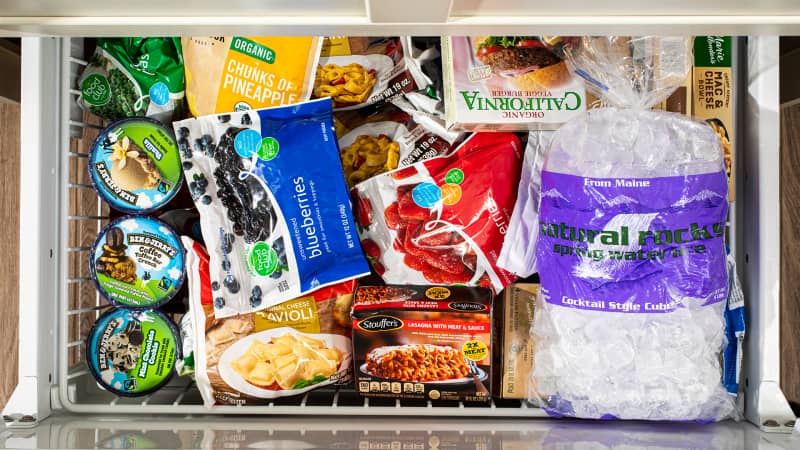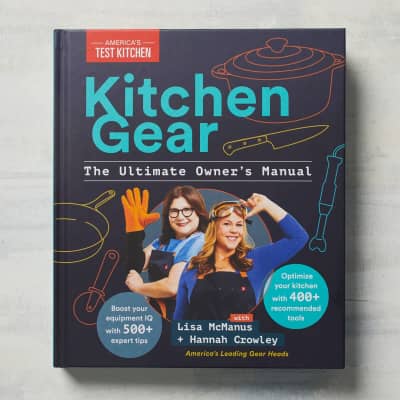As a member of the ATK Reviews team, I test kitchen equipment from home. My job puts some out-of-the-ordinary demands on my fridge and freezer. In the course of testing, I make a lot of food—often food in excess of what my small household can eat or donate.
Is There Such a Thing as a Freezer That’s Too Full?
Published Mar. 7, 2024.

Not only do I try to freeze what I can’t immediately use, but also I often need to stockpile certain ingredients that are hard to find out of season. Testing turkey fryers in April sometimes means socking away three 15-pound turkeys in November, for example.
Sign up for the Well-Equipped Cook newsletter
Shop smarter with our ATK Reviews team's expert guides and recommendations.
As a result, my freezer is usually packed pretty solid, to the extent that visitors are often dismayed at the sheer volume of food in there. I go through it reasonably quickly—in a busy week, there is nothing better than having quarts of stock left over from breaking down whole chickens for work or a few pounds of pulled pork from smoker testing at the ready.
Not that I need to defend myself, since my problem is largely occupational, after all. But from time to time, I’ve heard that a full freezer is actually a good thing. To find out if this is actually true, I did a little digging.
Is a Full or Empty Freezer Better in a Power Outage?
This much isn’t really up for debate. The more cold food is in your freezer, the colder it will stay if the power goes out. If you don’t open the freezer door at all, a full freezer will maintain its temperature for up to 48 hours before it starts to warm up—a half-full freezer will only last half as long.
Kitchen Gear: The Ultimate Owner's Manual
Packed with science-backed advice from professional equipment reviewers, practical how-to guides, engrossing trivia, and 100+ recipes that showcase great gear, this guide is an indispensable source of collected wisdom found nowhere else.Is a Full or Empty Freezer More Energy-Efficient?
This is where things get trickier. When we contacted the Massachusetts Department of Energy Resources, they told us that there actually isn’t a ton of research on this question.
Their representative told us: “A freezer full of food should maintain its temperature better than an empty one”—with “lower temperature fluctuations when the door is opened.” As they explained, though: “[Y]ou also need to get that food cold in the first place, which will take a lot more energy than cooling air.”
Echoing this recommendation by appliance manufacturer Whirlpool, the representative told us, “75-80% full as a best operating condition seems reasonable, though it’d really depend on the air flow and spacing.” That is, in order to keep your freezer working properly, you need to keep food from blocking the air vents, which allow cold air to circulate around the freezer and keep everything frozen.
The representative continued, “However, it takes so much energy to freeze/cool things initially that it’s not worth loading up the freezer with stuff just to have it run more efficiently on a day-to-day basis.” In fact, the representative estimated, you probably wouldn’t save more than about $2 per year operating a full freezer versus an empty one.
Preserve Freshness by Freezing Food Fast
To prevent freezer damage, it’s a race against time.Can Your Freezer Be Too Full?
The good news is that it doesn’t ultimately matter much whether you keep your freezer full or empty. The exception is if you live in an area where power outages are common: if that’s you, you’ll want to keep your freezer full to help keep foods cold longer when you lose electricity.
Best Practices for Freezing
Whether you keep your freezer full-to-the-brim or only partially so, there are some key things to keep in mind when freezing items.
- Don’t block the air vents. In order to keep the air circulating in your freezer (which keeps things cold and maintains a consistent temperature), keep the air vents clear.
- Don’t refreeze meat. Once you’ve defrosted that frozen steak, don’t refreeze it. Doing so will result in a dry, tough texture.
- Keep your freezer at 0 degrees. Invest in a freezer thermometer to monitor the temperature and ensure optimal food safety.
- Wrap food tightly. Removing as much air as possible helps prevent freezer burn. If you freeze a lot of items, consider springing for a vacuum sealer.
- Freeze food in a single layer. No matter what you’re freezing—from berries to green beans—freezing the items on a baking sheet helps them freeze quicker, resulting in less damage. (Even better? Quick-chill your meat.)


